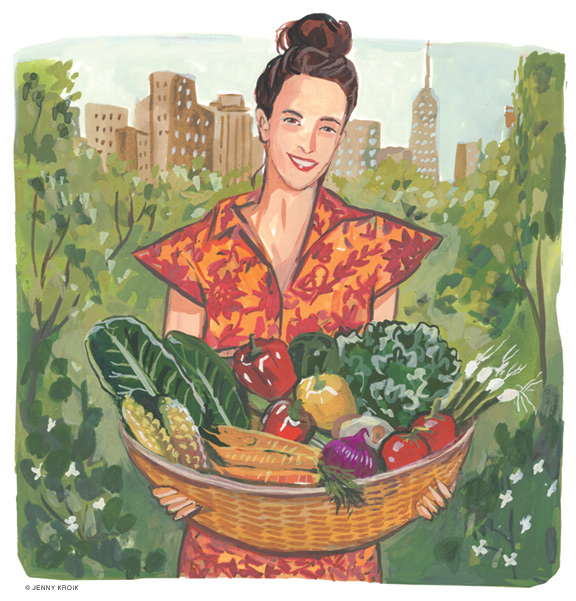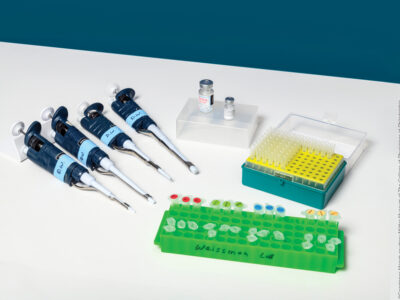
This health-conscious entrepreneur is shaking up the meal delivery service game.
Rachel Drori C’04 was beyond stressed.
As a 20-something living in New York and working for a leading ecommerce company, she was “running between meetings without a second to eat or go to the bathroom.” It didn’t help that she was also planning her own wedding at the time. “I was burning the candle at both ends,” Drori says.
She hit a low when her body broke out in hives, something doctors believed was linked to a poor diet. “I realized I was eating trail mix and stale birthday cake between meetings, and it was taking its toll,” she says.
Knowing she needed to eat healthier, she hatched an idea. Meal kit delivery services like Blue Apron and Home Chef had been around for a few years—but what if she created one that delivered nutrient-packed meals like smoothies, soups, and vegetable bowls that customers could put in their freezer and pull out when they needed to eat?
And that’s how Daily Harvest, a plant-based meal delivery service, was born.
Launched in 2016, Daily Harvest earned more than $250 million in revenue five years later, while raising $77 million from big-name investors including Serena Williams and Gwyneth Paltrow, and reaching a valuation of $1.1 billion. It now has more than 325 employees, most of whom work out of its New York headquarters.
Drori had always been interested in nutrition. Growing up in Long Island, New York, she was a competitive lightweight rower and learned about “fueling your body and optimizing your performance.” At Penn, she became involved in the Urban Nutrition Initiative, a Netter Center program that works to improve food access in West Philadelphia. There she taught first graders how to garden and helped run a food stand where kids or their parents could trade in cookies and chips for oranges and avocados.
Those experiences taught her the crucial link between nutrition and access. And after initially working in marketing out of college at the Four Seasons, American Express, and the Gilt Groupe, in between a stint at Columbia Business School, she returned to those lessons a decade later.
When Drori first came up with the idea for Daily Harvest, she “literally bought frozen ingredients from Trader Joe’s and packaged it up at a commercial kitchen in Long Island City,” she says. “I bagged everything into this really ugly packaging and delivered it in my car”—mostly to friends and family members. Within eight weeks, she achieved her initial goal: to have five times more subscribers who were strangers than people she knew. “It was very, very fast, and I think it’s because I was solving a real problem,” she says.
Daily Harvest’s mission is to make it more convenient for people to eat at least one more daily dose of fruits and vegetables, and it works with 450 farmers around the globe to make sure it can include a diversity of plants in its offerings. “Our supply chain is really robust,” Drori says. “It gives us tons of ability to create differentiated food for individuals and to be able to respond to customers’ needs in real time.” The team works with farmers directly to find unusual and interesting crops that will be good for their soil (soil needs crop diversity or it will get depleted) and satisfying to customers. For example, when a farmer in Montana expressed a need to plant a new cash crop, the company combed through its data and learned customers wanted more protein. The farmer is now growing black butte chickpeas, a rare and protein-rich type of chickpea traditionally found in India.
The vast majority of the farms Daily Harvest works with are already organic, and the company is working with the others to help them transition within the next three years. “We partner with farmers on their journey to becoming organic and let them know that we will buy their crops,” Drori says.
Drori also knows that if her mission is to get everyone to eat more fruits and vegetables, she has to expand beyond frozen meals. Even though frozen food can be more nutritious than fresh food that lingers too long on the shelf, there are still some people who won’t buy it because of a certain stigma. “You have years of microwave dinners etched into people’s minds,” Drori says.
In April the company started selling more grocery-like items for people who want to add something healthy to food they already make. One is a plant-based crumble that you could add to a salad or a pasta.* Another is almond milk that you can actually make at home. “A carton of almond milk is like 10 almonds and a gallon of water. Food companies add a lot of junklike fillers and stabilizers so it can sit on a store shelf for weeks,” Drori says. “Ours is undiluted almonds and oats that you add your own water to make almond milk. There is nothing else added to it.”
In February Daily Harvest also debuted its first brick-and-mortar tasting room in Chicago, where customers can sample items and buy meals to eat there or take home.
“Sixty five percent of people don’t buy food online, even after the pandemic,” Drori says. “If our goal is to get everyone to eat more fruits and vegetables, we decided we had to create a place like this.”
—Alyson Krueger C’07
*After our magazine went to press, the company recalled its French Lentil + Leek Crumbles following reports of customers getting sick from it.




